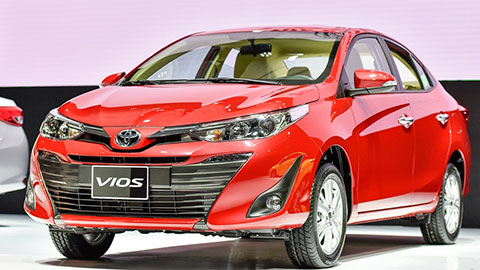Vietnamese market saw February automobile sale of more than 17,600 units, marking a year-on-year increase of 41 per cent, according to statistics from the Vietnam Automobile Manufacturers’ Association (VAMA).

Viet Nam’s automobile market recorded more than 17,600 sales in February, marking a year-on-year increase of 41 per cent, according to statistics from the Vietnam Automobile Manufacturers’ Association (VAMA).
Of the figure, the volume of passengers cars reached nearly 12,500 units, followed by commercial cars with more than 4,800 units and special-purpose vehicles with 330 units.
Despite the spread of COVID-19 in the northern province of Vinh Phuc, which is a hub of automobile manufacturing and assembly, domestically assembled 11,700 units last month, up 22 per cent from the previous month, while the number of imported cars decreased by 4 per cent to 5,900 units.
TC Motor also announced total sales results in February of 4,330 units, up 10.4 per cent over the same period last year.
Insiders said that although Viet Nam’s February sales had seen growth, it was still difficult to avoid the impacts of COVID-19 as China is an auto components and spare parts production hub supplying products for automakers in the US, Japan, South Korea and Viet Nam.
When production in China slowed the global supply chain of components would too.
Global media recently reported that some automakers had temporarily suspended operations or downsized due to the pandemic. German carmaker Volkswagen confirmed it had closed factories in China over concerns of the disease and a lack of production parts. BMW, Daimler, Toyota, Honda, Nissan, Ford, GM and Tesla also suspended production from February in China.
In South Korea, Hyundai was forced to close automobile assembly plants due to a shortage of parts from China. South Korean automaker SsangYong Motor (owned by Indian conglomerate Mahindra & Mahindra) and French carmaker Renault temporarily suspended plant operations in South Korea due to the lack of components. The same situation can be seen in Europe, the US and Japan, which are to some of the world’s most famous car brands.
Domestic preparations
A representative of Toyota Motor Vietnam (TMV), who wanted to remain anonymous, told nguoilaodong.vn that the firm’s imports of components and parts, production and business activities were still running as normal. However, TMV was continuing to closely monitor the situation to make appropriate plans, trying to avoid affecting production and business.
"TMV has no plans to change its sales strategy in the near future but it has proactively made plans to ensure safety for employees as well as maintaining operations," he said.
Meanwhile, Mercedes-Benz Vietnam (MBV) said to serve locally-assembled car production, the firm had to import parts from Germany. Although it was still running at full capacity, it expressed concern that the disease would make customers afraid to go shopping, leading to reduced demand and dragging on car prices and sales.
According to the director of the Industry Department under the Ministry of Industry and Trade Truong Thanh Hoai, a number of automakers said they had not yet been affected by the pandemic, but they would start to run out of components and parts next month.
In 2019, of the nearly US$4 billion of imported components and spare parts, 18 per cent came from China and nearly 29 per cent from South Korea. As for trucks, more than 70 per cent of components and spare parts were imported from China.
"Even in large countries with a high localisation rate [local supply], it is unavoidable to be affected because only very small components don’t need to be imported, the whole production process is stopped,” Hoai said.
“Viet Nam is no exception. For the automobile industry, it is not easy to find short-term replacement supplies due to the specific technology and quality suitable to the standards of each company," he added.
He said that not all businesses were willing to give specific information about the shortage of spare parts and accessories due to sensitive reasons. "It is not right to say that it is possible to find replacement sources. The current situation is that there is no way out and there seems to be no other way. We have to wait for the next development - the most unpredictable factor is that we don’t know how long the disease will last.”
Hoai proposed the Government directly negotiate with Chinese authorities to consider appropriate border control measures, preventing the pandemic from spreading and ensuring the supplies of spare parts and components for automobile production. — VNS





